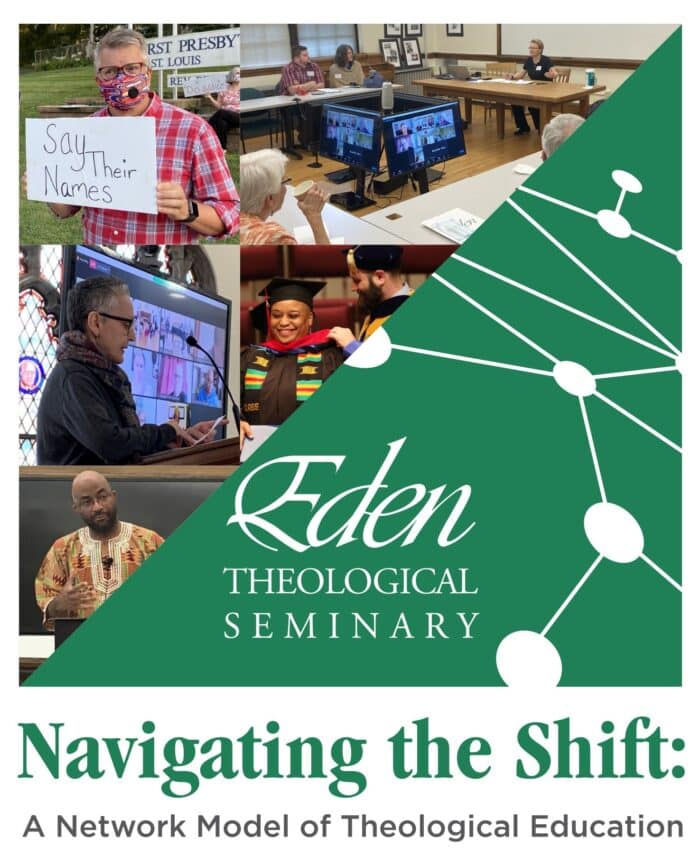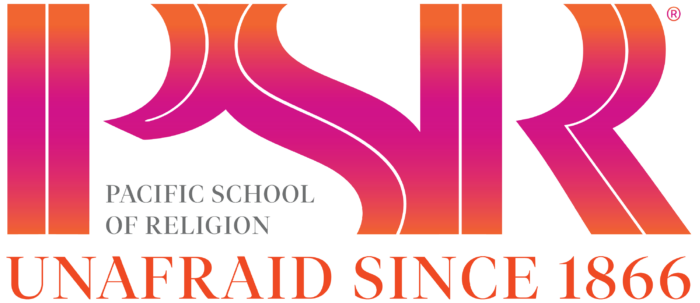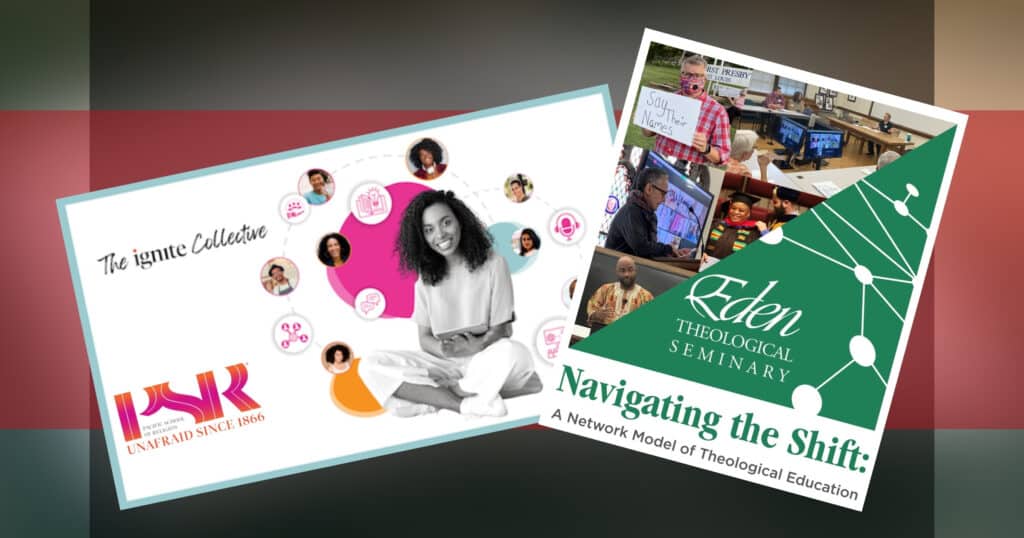Amid ‘major cultural shifts,’ millions from Lilly will help seminaries innovate, collaborate
Two United Church of Christ seminaries have received $5 million each to try new things in the rapidly changing world of church and ministry — and to do so beyond their traditional campuses.
Eden Theological Seminary and Pacific School of Religion are among 16 recipients of the latest round of Pathways for Tomorrow Initiative grants from the Lilly Endowment.
Eden, situated near St. Louis, will use the funding to pursue a “shift in form” from the “free‐standing theological school” to a “network model for theological education.” It aims to “empower leaders … for vital vocations” at a time when congregations are adapting to “major cultural shifts.”
PSR, in California’s Bay Area, will ramp up what it describes as an “innovative educational ecosystem,” which is already in pilot as The Ignite Collective.
Working with partners, both plan to give more people access to what seminaries have to offer. That includes expanding where and how seminary education happens and who takes part in it.
‘Paths to the future’
Lilly described all 16 grantees as “large-scale collaborative programs to better prepare and support pastoral leaders for Christian congregations.”
“Many theological schools believe that their paths to the future depend on their abilities to form strategic partnerships with other schools and church agencies,” said Christopher Coble, the endowment’s vice-president for religion.
“These grants will help seminaries develop innovative and collaborative approaches to theological education that we believe will strengthen their efforts to prepare and support excellent leaders for Christian communities into the future.”

‘Ministry in context’
Eden’s $5 million will fund what it calls A Network Model of Theological Education. The idea flowed from a study the seminary did with an earlier $50,000 grant from Lilly.
Eden used that initial grant to analyze its “contextual education” curriculum — something Seminary President Deb Krause said has been “the heart of the Eden way of theological education” for 50 years. It immerses all students in congregations and church organizations as part of their studies. She said this “formation for ministry in context” means that “students, as they are studying theology, are also always reflecting on that and applying it in conversation with mentors in ministry.”
Krause said the study focused on the last 20 years and how “our alumni have been shaped and impacted and have in turn impacted the progressive Christian movement as leaders.” It found the curriculum produced clergy who are “engaged in community ministries, and whose congregations are collaborating and networking themselves,” she said. And that, she said, “was like jet fuel for our continuing to develop this proposal.”
‘Connect more broadly’
Now Eden will expand on that strength by offering education more widely and in different formats. It will do so with three kinds of collaborating partners (they are named in more detail here):
- Other theological schools. Its list of interested collaborators includes UCC-related Chicago Theological Seminary and United Theological Seminary of the Twin Cities, as well as other Midwestern schools in Canada and the U.S. One aim, Krause said, will be “to use the online environment as a way to build catalogs where we can share courses.” Eden has already begun that experiment with United.
- Colleges and universities. The idea, Krause said, is to “awaken a new generation to the potential of the congregation as a space in which to pursue social justice and the common good and community engagement.” Eden will focus on undergraduate schools that already offer “socially transformative contextual learning” and students who are passionate about it. UCC-related Lakeland University and LeMoyne-Owen and Tougaloo colleges are among the interested collaborators.
- UCC bodies that authorize ministry. Eden will develop new ways of working with associations and conferences as they assess candidates’ readiness and support those already in ministry. It will focus on competencies described in such UCC documents as “Multiple Paths for Ministry” (2005) and the “marks” of readiness described in the UCC Manual on Ministry. Six UCC conferences will be initial collaborators.
“Regionally, in St. Louis, we’ve got a network here of over a hundred progressive congregations, organizations and mission agencies of the church,” Krause said. “Well, let’s expand that nationally. That’s what this proposal is doing. It’s really giving us a way to connect more broadly with these kinds of organizations and missions to do theological education in partnership, and to meet candidates for ministry and leaders in ministry where they are. Via online learning, we are able to do that.”
‘Connect emerging leaders’

Like Eden, which was founded in 1850 by the UCC’s German Evangelical predecessors, PSR also has long UCC ties: Congregationalists founded it in 1866. PSR President David Vásquez-Levy said those roots will matter to the seminary “as we embark on the development of our new ecosystem,” thanks to the Lilly grant. “Today UCC leaders make up the largest percentage of our students,” he said.
Now, through technology, PSR will cast an even wider net. Its Lilly-funded project fits with what the school describes as its “long-term objective to reach emerging leaders seeking spiritually rooted transformation.”
PSR Director of Communication Hallie Fryd said the project will create “a distributed learning platform to provide theological education that is more accessible and affordable, with multiple entry points for students.”
“The platform will connect emerging leaders — from inner cities and rural areas, from congregations and social movements — to each other and to educational resources often not accessible to them,” PSR said in a news release. “Participants will have access to short courses, gatherings, coaching, and events that will strengthen their preparation and build their networks.”
Wisdom of the marginalized
Now being piloted as the Ignite Collective, the platform aims to “create community and offer leading-edge content created by and for a majority people of color network,” Fryd said.
Fryd said Ignite uses a training framework called Wisdom-Based Leadership, which “centers the wisdom of marginalized communities for social transformation.” Its three core competencies are “courageous collaboration, creative communication and contemplative care.”
“This framework is designed to draw from the many resources available across cultural and spiritual traditions and is adaptive to emergent realities as they occur in communal life,” she said.

‘Curated group of partners’
Fryd said the PSR ecosystem will take three years to develop:
- Year 1 will focus on the Ignite pilot and “test out various elements of the platform.”
- Year 2 will create an “incubator that will help onboard a set of partners.” As noted in the news release, the incubator will “help a curated group of partners, with a focus on communities of color, to adapt or create content for the platform and offer training in community building and promotion.”
- Year 3 will launch the platform more widely. “We’ll then use learnings from that process to create best practices for onboarding partners as the platform grows.”
PSR’s news release said the new platform will “offer space for partner seminaries, organizations and individuals to host and deliver their own content.” Among those, Fryd said, “adding partner organizations will be the most important aspect of the ecosystem.”

“Those partners will be announced as we move into that phase of the project in about a year,” she said.
The goal is for the platform to become self-sustaining through membership fees from participants.
Other UCC recipients
J.K. Lilly Sr. and his sons, Eli and J.K. Jr., founded the Lilly Endowment Inc. in 1937 with gifts of stock in the family’s pharmaceutical firm. Their goal was the “promotion and support of religious, educational or charitable purposes.” An online description says the Pathways grants are meant to “help theological schools strengthen and sustain their capacities to prepare and support pastoral leaders for Christian churches.”
Besides closely UCC-related Eden and PSR, the current list of grant recipients also includes a seminary historically related to the UCC: Union Theological Seminary, New York City.
Grants in previous Lilly phases also went to United and to the UCC’s historically related Hartford (Conn.) International University for Religion and Peace, Interdenominational Theological Center in Atlanta, Seminario Evangélico de Puerto Rico, and Union.
‘Committed to common good’
The presidents of PSR and Eden both said they hope their Lilly-funded projects will ultimately affect and support congregations and members of the UCC — even, and perhaps especially, in a time of rapid change.
“We’re excited to partner with the UCC in supporting pastors and congregational lay ministers as they discern their gifts and callings, prepare them for effective and faithful leadership in the church and connect them to a network of opportunities to advance their own well-being and the communities they serve,” Vásquez-Levy said.
“We call it ‘Navigating the Shift’ because that’s what we’re doing,” Krause said. “We’re in the midst of that. We don’t know the end of it. We don’t know what the institutional forms of the church are going to look like.
“But we also aren’t giving up on the congregation. And in theological education, particularly within the progressive mainline, it has felt a little bit in vogue in the past 10 years or so to say, oh well, I guess the congregation is a thing of the past. And particularly in a time like this, when fascism is on the rise and misinformation and disinformation and the forces of tyranny and anarchy and violence are arising, we can’t abandon the social organizations committed to the common good, like a congregation.
“So, yes, the form of the congregation is obviously changing and shifting, but it will endure in some form. People will gather in ways to worship and to pursue mission. And we in the progressive tradition want to be about strengthening and supporting the communities as they navigate that.”
Content on ucc.org is copyrighted by the National Setting of the United Church of Christ and may be only shared according to the guidelines outlined here.
Related News
A Moment of Silence
The weekend news was alarming. Two students shot and killed with 9 injured at Brown University...
Read MoreIn hope-filled worship service, UCC and United Church of Canada celebrate full communion past and future
On Saturday, Dec. 13, many from the United Church of Christ (UCC) and the United Church of...
Read More‘A Gift of God to the World:’ Christmas greetings from the General Minister and President
As Christmas quickly approaches, UCC General Minister and President/CEO the Rev. Karen Georgia...
Read More


